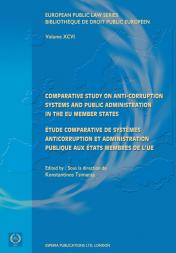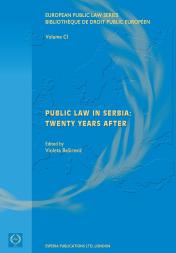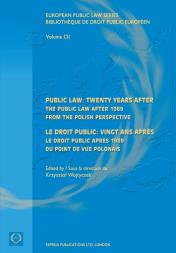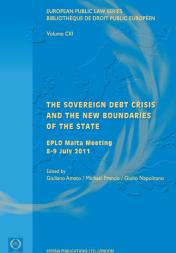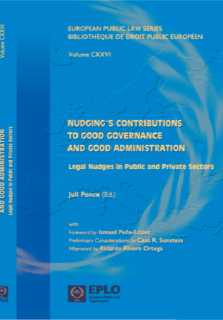
Juli Ponce (Ed.), Nudging’s Contributions to Good Governance and Good Administration – Legal Nudges in Public and Private Sectors, (with: Foreword by Ismael Peña-López, Preliminary Considerations by Cass R. Sunstein, Afterword by Ricardo Rivero Ortega), European Public Law Series / Bibliothèque de Droit Public Européen, vol. CXXVI, European Public Law Organization (EPLO), Athens, 372 pp., 2022, ISSN: 2308-8648, ISBN: 978-618-5417-13-0
The relationships between behavioral insights, law and other sciences and public administrations is an exciting and (not so) new field of academic work and practical applications all around Europe and the world. There are still few publications on the topic from a legal point of view in Europe and even less works including a transdisciplinary perspective. The interest is continuously increasing thanks to the use of nudges against the Pandemic and several Nobel Prizes in Economy in the last years which have been awarded in relation to this issue. This book deals with the relationship between Law and other sciences (Economy, Linguistics and Political Science, especially) and behavioral insights in order to make effective the right to good administration and have a good governance. It considers how different nudges can improve the functioning of public administrations in an effective and unexpensive way, preventing corruption and maladministration. It also analyzes how nudging could lead to a better regulation of private sector in several fields, improving compliance through a less intrusive public intervention that respects the principle of proportionality.
Juli Ponce is a Law Professor, a former Assistant Dean at the University of Barcelona Law School and a former Director of the Public Administration School of Catalonia. He also was the Director of the TransJus, the transdisciplinary research institute at the University of Barcelona Law School which develops research activities in the fields of Law, Political Science, Criminology and Public Management, exploring their links with Neuro-sciences, Economics and other sciences. Juli is a frequent speaker on Public Law, good governance, the right to good administration, the better/smart regulation, the prevention of corruption and zoning and urban planning and housing law. Dr. Ponce has published in several prestigious academic journals throughout Spain, Europe, United States and Latin America. He is a member of the European Group of Public Law and has been a visiting professor and has lectured at the Universities of Georgia State (Atlanta, US), Sheffield (UK) or Pontifícia Universidad Católica del Perú, among others.
Contents
Foreword: If Not Rationality, Then What?
by Ismael Peña-López
Preliminary Considerations: Some General Ideas about Behavioral Insights and Nudges
by Cass R. Sunstein
I. Liberty-preserving Approaches
A) Nudges Maintain Freedom of Choice
B) Transparency and Effectiveness
C) The Need for Evidence and Testing
II. Ten Important Nudges
III. Institutionalizing Nudges: Two Approaches
I. Introduction: Behavioural Sciences and Nudges. Achievements, Criticisms and Future Developments
by Juli Ponce
I.1. Behavioural Insights
I.2. Nudges
I.3. Criticisms of Behavioural Insights and Nudges
I.4. The Need for Transdisciplinarity in Behavioural Analysis
I.5. This Book
I.6. Bibliography
II. Game Theory and Nudging for Good Governance
by David Jimenez-Gomez
II.1. Preliminary Concepts
II.1.1. Game Theory
II.1.2. Law and Game Theory
II.1.3. Behavioural Economics and Nudging
II.1.4. What Do We Understand by “Good Governance”?
II.1.5. The Concept of Well-being: A Key Factor for Good Governance
II.1.6. Behavioural Game Theory
II.2. Application of Game Theory and Nudging to Good Governance
II.2.1. Reducing Biases
II.2.2. Laws vs. Nudges
II.2.3. Transparency
II.3. Application: Blockchain
II.3.1. Transparency in Blockchain
II.4. Conclusion
II.5. Bibliography
III. Law, Nudging and Good Administration
by Juli Ponce
III.1. Public and Private Decision-makers and Rationality
III.2. Law and Behavioural Sciences: A Change of Paradigm
III.3. Nudging and Nudges
III.4. Behavioural Sciences, Nudging and Improving Decision-making in the Public and Private Spheres:
Specific Areas
III.5. Nudging, Authoritarianism and Proportionality
III.6. Behavioural Insights and the Covid-19 Pandemic
III.7. Final Considerations: Criticisms of Behavioural Insights and Nudging and Their Future
III.8. Bibliography
IV. Nudges and Public Law. Opportunity and Regulation
by Elisa Moreu Carbonell
IV.1. Nudges as Tool for Guiding Behaviours and Improving Compliance with Regulations
IV.2. Conceptual Definition
IV.2.1. Positive Definition
IV.2.2. Negative Definition
IV.3. Types of Nudges and How They Fit into the Traditional Classification of Administrative Action
IV.3.1. Based on the Behavioural Norm or Bias that the Nudge is Intended to Influence
IV.3.2. Based on the Levels of Application of the Nudge
IV.3.2.1. Regulatory Nudges
IV.3.2.2. Non-regulatory Nudges
IV.3.3. Based on the Nudger: Public and Private Nudges
IV.4. Examples of Nudges in Public Policies
IV.5. Limitations and Risks Associated with Nudging
IV.5.1. Legal Limitations
IV.5.2. Technical Limitations
IV.5.3. Ethical Limitations
IV.6. Conclusions and Debate
IV.7. Bibliography
V. Cognitive Psychology, Automatic Thinking and Administrative Law Teaching
by Francisco Velasco Caballero
V.1. Rationality and Irrationality in the Teaching of Administrative Law
V.2. “Super Positive” Law and Enhanced Rationality in Administrative Law Teaching
V.3. Automatic Cognition and Law Teaching
V.4. Curricular Contents and Teaching Methods for the Automatic Application of Administrative Law
V.4.1. Conditions of Senders and Recipients
V.4.2. Concepts as Stereotypes
V.4.3. Legal Systems as Cognitive Schemes
V.4.4. Reference Sectors
V.4.5. Examples and Prototypes
V.4.6. Explanatory Language
V.4.7. In-class Discussions
V.5. Bibliography
VI. Linguistics and Behavioural Sciences
by Estrella Montolío Durán / Fernando Polanco Martínez / M.ª Ángeles García Asensio
VI.1. Introduction
VI.2. Linguistic Studies on How to Persuade the Receiver
VI.3. Words Matter
VI.3.1. False Synonyms (Strategic Synonyms)
VI.3.2. Lexis that Gives Different Perspectives
VI.3.3. The Renaming of Negative Concepts (Euphemism)
VI.4. Syntactic Procedures
VI.4.1. Word Order and Invited Inferences
VI.4.2. Word Order and the Primacy Effect
VI.4.3. Information Order and Cognitive Effects (Framing and Bandwagon Effects)
VI.5. Language Use as Strategic Action
VI.6. Language Use and Institutional Communication
VI.6.1. Linguistic Politeness and Communicative Immediacy
VI.6.2. Inclusive, Collaborative Language
VI.7. Conclusion
VI.8. Bibliography
VII. Tax Psychology: How Behavioural Tools Can Improve the Tax System
by Pablo Grande Serrano
VII.1. An Overview of the Behavioural Sciences and their Toolbox
VII.2. Tax Psychology
VII.3. Criticisms and Limitations
VII.4. Conclusions
VII.5. Bibliography
VIII. Nudges and Tax Penalties: Between Incentive and Deterrence
by José-Andrés Rozas
VIII.1. Approach
VIII.2. How the Behavioural Sciences Feed Into Tax Policy
VIII.3. The Tax Compliance Equation (WBAD)
VIII.3.1. Tax Policies of Prevention
VIII.3.1.1. Clear Communication
VIII.3.1.2. Ethical Component
VIII.3.1.3. Tax Numbness and Loss Aversion
VIII.3.2. Tax Policies of Incentive
VIII.3.2.1. Tax Lotteries
VIII.3.2.2. Informational Letters and System Certification
VIII.3.2.3. Discounts for Payment by Direct Debit
VIII.3.3. Tax Policies of Deterrence
VIII.3.3.1. The Incentive for Repentance
VIII.3.3.2. Naming and Shaming
VIII.4. Conclusions
VIII.5. Bibliography
IX. Plain Writing: A Nudge to the Democratic Requirement for Transparency in Government-to-Citizen Communication
by M.ª Ángeles García Asensio / Fernando Polanco Martínez / Estrella Montolío Durán
IX.1. Introduction
IX.2. Cognitive Biases and Linguistic Nudges
IX.3. Plain Language and the Right to Understand Government Communication
IX.4. Writing in Plain Language
IX.5. Practical Application of Plain Writing
IX.6. Conclusions
IX.7. Bibliography
X. Behavioural Analysis and Public Policy Evaluation: A Virtuous Circle
by Santiago A. Martín Nájera
X.1. Introduction
X.2. Resistance to the Use of Behavioural Analysis and Evaluations
X.3. New Goals, New Policies
X.4. Limits of Behavioural Analysis
X.5. Practical Examples of the Use of Behavioural Analysis
X.6. The Importance of Good Regulation
X.7. The Creation of Public Policies
X.8. The ex-post Evaluation of Regulations can Create a Virtuous Circle
X.9. Definition of Evaluation
X.10. The Intervention of External Oversight Bodies to Enhance Regulation through Behavioural Analysis
X.11. Conclusion
X.12. Bibliography
Afterword
by Ricardo Rivero Ortega
I. The Need for Innovation in Administrative Law
II. Are Cognitive Strategies Constitutionally Acceptable?
III. The Need to Create Nudge Units
IV. Good Regulation and Nudges: Why Spend or Ban when There Are Less Oppressive Alternatives?
V. A Government Intervention Respectful of Personal Freedom














